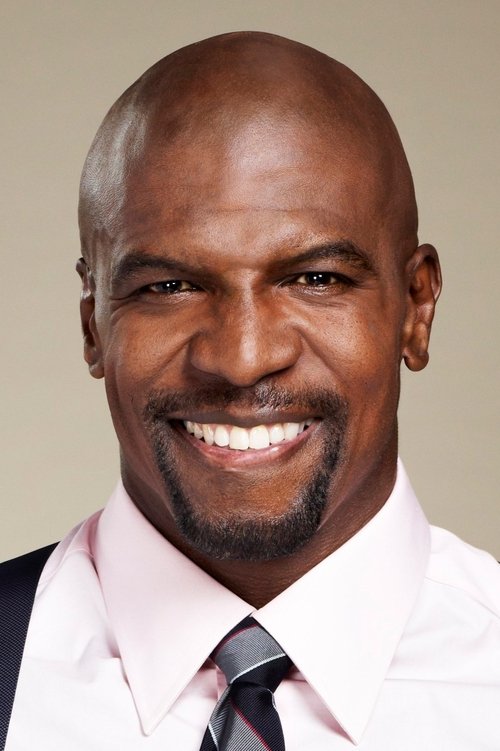Terrence Alan Crews (born July 30, 1968) is an American actor, comedian, activist, artist, bodybuilder and former professional football player. Crews played Julius Rock on the UPN/CW sitcom Everybody Hates Chris. He hosted the U.S. version of the game show Who Wants to Be a Millionaire and starred in the BET reality series The Family Crews. He appeared in films such as Friday After Next (2002), White Chicks (2004), Idiocracy (2006), Blended (2014), and the Expendables series. Since 2013, he has played NYPD Lieutenant Terry Jeffords in the sitcom Brooklyn Nine-Nine. He began hosting America's Got Talent in 2019, following his involvement in the same role for the program's spin-off series, America's Got Talent: The Champions.
Crews played as a defensive end and linebacker in the National Football League (NFL), for the Los Angeles Rams, San Diego Chargers, and Washington Redskins, as well as in the World League of American Football (WLAF) with the Rhein Fire, and college football at Western Michigan University.
Crews, a public advocate for women's rights and activist against sexism, has shared stories of the abuse his family endured at the hands of his violent father. He was included among the group of people named as Time Person of the Year in 2017 for going public with stories of sexual assault.
Description above from the Wikipedia article Terry Crews, licensed under CC-BY-SA, full list of contributors on Wikipedia
Organised, caring and driven by duty the ESFJ personality type loves to contribute and remain constantly valued, productive, busy and liked. The ESFJ has an action-orientation that they will channel into people, helping and finding practical solutions to people issues and they'll work hard at making this happen as they are naturally oriented to the needs of those around them. Whilst the ESFJ wants everyone to feel valued, they will also want to feel part of the group themselves - they need to feel included. If someone is hurting, the ESFJ will be the first to respond.
The ESFJ character shares the same action-orientation of the ESTJ but with a people-based focus, they channel their drive, energy and practical nature into helping people. Driven by a sense of duty they are the cooperative, helpful, sympathetic and personable pragmatists, disliking anything ethereal or woolly as they prefer practical solutions to people issues, and they'll work hard at making this happen. Unlike the ESFP the ESFJ will want a plan and closure, they do not like loose ends or anything they perceive as sloppy or messy. As with most 'S's, they prefer the concrete, inhabiting a world of facts and the ‘here and now.’ Asking an ESFJ to sit and think things through or reflect before ‘doing’ is not easy as their natural propensity is for action; thinking is seen as a passive and useless activity. This means they will jump immediately into ‘sorting it all out,’ when at times if they’d taken a little longer to think they may have come up with a better solution. Organised, caring and driven by the known, routine comes naturally to the ESFJ who fear change as it is drags them out of the place where they feel they are strong and where they can contribute.
Conscientious and caring, the ESFJ will be good at follow-through and making sure the routine is taken care of, but may struggle with anything which appears complex, or which is perceived as not clearly getting the intended result or which causes conflict or disharmony. They value family links, friendships and tend to be slightly sentimental in their approach. Under pressure an ESFJ may become like the 'controlling parent,' smothering others in their attempt to provide support and believing that their way is best, becoming sensitive to any perceived criticism. Their values of ‘doing good’ and working hard to make sure things and people are taken care of are at the core of the ESFJ although they may at times try to instil these parental-style values in others, often using parental type words like "should," "ought" and "must." These are all said with a good heart and desire to help but the subjective nature of the ESFJ means that they may almost impose what they think is best in their desire for immediate practical help.
Being ‘F’s ESFJs may have trouble making more logical and factual decisions so driven are they by their values and wishing to maintain harmony, so their decisions will be primarily driven by the needs of those around them especially those close to them whom they feel a duty to ‘care for.’ Everything for the ESFJ becomes personalised and will be filtered through a more subjective ‘how do I feel about this person’ lens, rather than being objective and logical as a logical approach for the ESFJ is equated with being cold and harsh thus negating being helpful which is at the core of the ESFJ being. After a day interviewing I asked my ESFJ secretary to tell the successful candidate he’d got the job. “Was he the nicest?” she asked, “Did you like him best?" No issue of ‘suitability’ even crossed her mind! They tend also to have more of a ‘gate-post,’ binary mentality, seeing things in very black and white, ‘good or bad,’ ‘right or wrong,’ ‘nice or horrible.’ Being driven by feelings can also mean that the ESFJ gets hurt easily by any perceived or real criticism as everything is taken so personally, so factually and they can dwell on such criticism. Anything which appears complex or which has many shades of grey will be dismissed as it doesn’t conform to the ‘natural laws’ of ‘ESFJ common sense.’ They’ll want to jump in and help, which is why they were, according to their own values, ‘put on this earth.’
Choose another celebrity type to compare side by side the different approaches work, attitudes to conflict and the way they engage with others.
